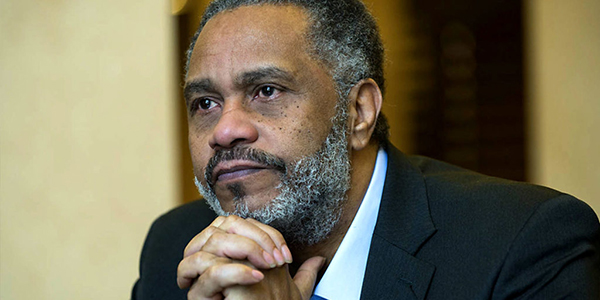From death row to freedom: speaker shares firsthand racial injustice story

“For 30 years, the State of Alabama took a piece of me every day, and they did it because I was born Black,” said Anthony Ray Hinton. “[The state] was going to execute me and was going to get away with it if God hadn’t sent me his best attorney.”
Hinton’s life story can spark outrage at justice gone wrong while providing a dose of relief that truth eventually won. In a Sept. 2 virtual event, Hinton spoke to Binghamton University students, alumni and friends about his nearly three decades on death row and his arduous path to freedom.
“A Conversation with Anthony Ray Hinton: Diversity, Unity and Justice” explored racial inequality and systemic oppression in America’s criminal justice system, activism, resilience and building relationships to create a more just world.
Hinton was arrested in 1985 and charged with the murders of two fast-food restaurant workers based on the premise that a revolver taken from his mother’s home was the weapon in both capital murders as well as a third crime.
On his way to jail immediately following his arrest, he quickly learned he was in a system where the odds were heavily and almost hopelessly stacked against him. It didn’t matter that he had an alibi ― he was working when the crime was committed ― or that the supposed murder weapon hadn’t been used in 25 years.
“[They] came to my home and kidnapped me,” said Hinton in an emotional speech from his home in Alabama. “They didn’t use the word kidnap, but they said they had a warrant for my arrest…I asked them 50 times why I’m being arrested, and they never responded.
“One of the detectives said, ‘I don’t care whether you did or didn’t do it, I’m going to make sure you’re found guilty…There are five things that will find you guilty. One, you’re Black. Two, a white man is going to say you shot him. Three, you’re going to have a white prosecutor. Four, you’re going to have a white judge. And, five, you’ll have an all-white jury. Do you know what that spells? Conviction.’”
Hinton was convicted of two capital murders and sentenced to death, and would become one of the longest-serving inmates on death row in the state’s history. For three years, a lawyer from Boston worked on Hinton’s case but they fundamentally disagreed on their intended course of action.
“He said, ‘Anthony, I can get you life without parole,’” Hinton said. “I said, ‘That’s for guilty people, not innocent people. The fact that you want me to get life without parole means you don’t believe me.’ I could never plead guilty to something I didn’t do.”
Hinton parted ways with the attorney and had no one working on his case. He later saw a prison guard engrossed in a television program and asked what he was watching. On the screen was a Montgomery-based lawyer named Bryan Stevenson, founder and executive director of the Equal Justice Initiative (EJI).
“I knew this was the man I needed to represent me,” Hinton said. “I wrote him a letter saying, ‘I know you get a lot of letters from inmates saying they’re innocent, but I’m really innocent. I just ask that you read my transcript.’ Five months later, I got a letter saying he had read my transcript. He told me he’d come to see me and he did. The moment I shook this man’s hand, I knew God had sent me his best lawyer.
“I went before 14 judges in Alabama, and [they] refused to do the right thing. Mr. Stevenson decided we’d have to file my case in the U.S. Supreme Court. Two years later, the court did something it never had. It ruled that I was entitled to a new trial and sent the case back to Alabama.”
Unable to affirm the forensic evidence of the gun that was the main piece of evidence in the first trial, the state dropped all charges against Hinton and set him free. He wrote and published a memoir: The Sun Does Shine: How I Found Life and Freedom on Death Row (Macmillan, 2018).
Hinton’s story was documented in Stevenson’s book Just Mercy: A Story of Justice and Redemption (One World, 2015), the common read for first-year Binghamton students living on campus this fall and the current selection for the Alumni Association’s virtual book club.
Hinton, now a community educator for EJI, said African Americans make up 27 percent of Alabama’s population, but account for 96 percent of the state’s inmate count.
“When you speak of mass incarceration, it’s nothing but a code word,” he said. “It’s a new form of slavery. People in prison don’t have the right to speak about how they are treated.”
Prior to this virtual event, Binghamton students had watched Ava DuVernay’s documentary 13th, which takes an in-depth look at the American prison system, revealing a history of racial inequality.
Student Association President Khaleel James, Black Student Union Vice President Kendra Gourgue and Nicole Sirju-Johnson, assistant vice president for diversity at Binghamton University, were moderators for the virtual event.
